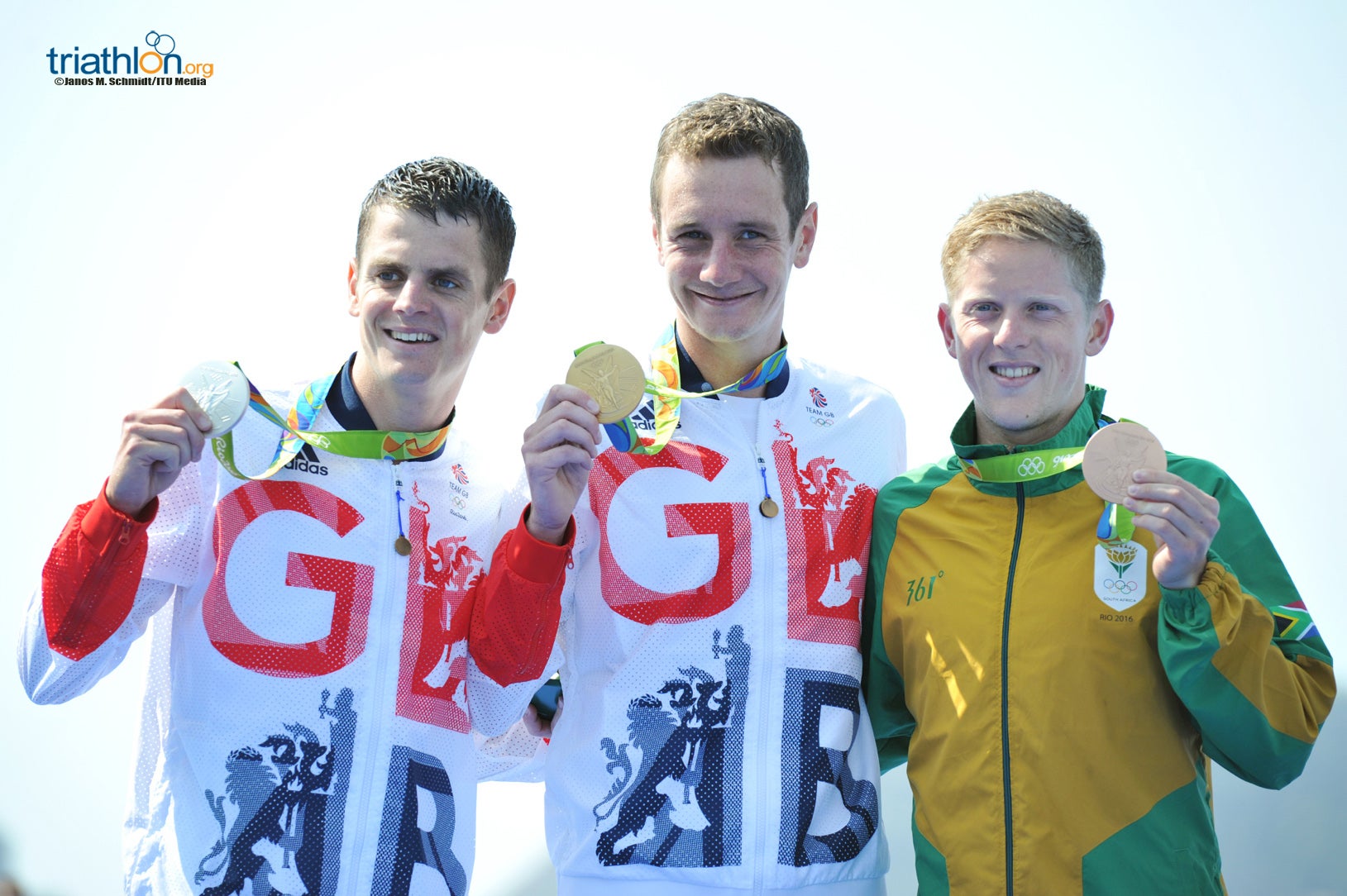The Biggest Surprise In Rio’s Olympic Triathlon

Schoeman on the podium with Jonathan Brownlee (silver) and Alistair Brownlee (gold). Photo: Janos Schmidt/Triathlon.org
Henri Schoeman’s rundown of his historic race for bronze
Most of Rio’s Olympic triathlon competition went according to script. Alistair Brownlee finished ahead of younger brother Jonathan to win his second consecutive gold medal; Gwen Jorgensen narrowly out-ran reigning Olympic champion Nicola Spirig to do what everyone expected her to do. The only major surprise came when relatively unknown competitor, Henri Schoeman, came falling across the finish 36 seconds after Jonathan Brownlee to take the bronze medal. It was South Africa’s first Olympic medal in triathlon and the feat was especially unexpected because Schoeman spent most of the week leading up to the race receiving treatment for flu-like symptoms. The 24-year old wasn’t even cleared by his doctors to compete until the evening before the race. We caught up with Schoeman a few days after he returned home to South Africa to find out how he nabbed one of the most unlikely medals of the entire Olympics.
Triathlete: A lot of people have been talking about what a surprise it was to have you finish with a bronze medal, but you came into the race ranked seventh in the world and had great form in your last couple of races. Did you feel like you were flying in under the radar and did your result surprise you at all?
Schoeman: Going into the race I definitely felt like the underdog. I have been finishing shy of a podium for two years now and it was only a matter of time before I broke through onto the podium. It couldn’t have come at a better time than on the biggest sporting stage in the world. My training had gone very well so I expected to have a very good finish.
It seemed like the Brownlees really took charge of the lead group on the bike and were encouraging the others to keep the pace up. How much communication was there within the group and what kinds of things were being said?
There was some communication in the front group, mostly to motivate everyone to come through to the front and take a turn in order to keep the break away. We all had the same goal and that was to build a fair amount of time between the chasers and us.
You seemed pretty content riding near the back of the lead group for the most part. Was that mainly because the pace was so high or were you just trying to save as much as possible for the run?
I never had a problem with the pace in a breakaway. I used a lot of energy trying to catch up to the front guys after a very bad first transition. After I was the last one to latch onto the front group, I needed a little bit of time to settle in before I started working with the group. Knowing I was not 100-percent healthy, I was being cautious to not using too much energy and conserve for the later stages of the race.
The Brownlees and Vincent Luis broke away almost immediately after T2. What was going through your head at that point? Did you think you had lost your chance at a medal?
It was very tempting to sprint off and join the Brownlees and Luis in the beginning of the run, but I ran within myself, knowing that there is still a long way to go. With it being a tough course in the heat of the day, I thought I could probably finish off stronger and gain a couple of positions towards the end. I told myself that it’s important to stay calm, composed and focus on the processes of the race.
At what point did you realize Luis was struggling and what was that moment like when you made the pass to put yourself into a medal position?
When I saw him fall off from both Brownlees after 1K and I saw that I was slowly gaining ground on him. After the first lap I caught up to him and felt that he was struggling to maintain the pace that I was running. I decided to lift the pace just a little and noticed that he couldn’t respond at all. At that point I realized I was contesting for a medal and I found a fight within me to push even harder.
How is your relationship with South African teammate Richard Murray and what did you two say to each other after you finished third and fourth?
Richard and I get along fairly well, but I think we have a fierce rivalry in competition. After the race we were both very happy about our strong performances on the day.
What has the response been in the local media in South Africa, and how much of a boost do you think this can give triathlon in your country?
The media exposure and attention has been really good. Triathlon is not very big sport in South Africa so I’m very glad that this medal has brought the spotlight onto triathlon and gives me the opportunity to show people what it’s all about. It’s a chance to inspire the youth, as well as people to get involved and grow triathlon.